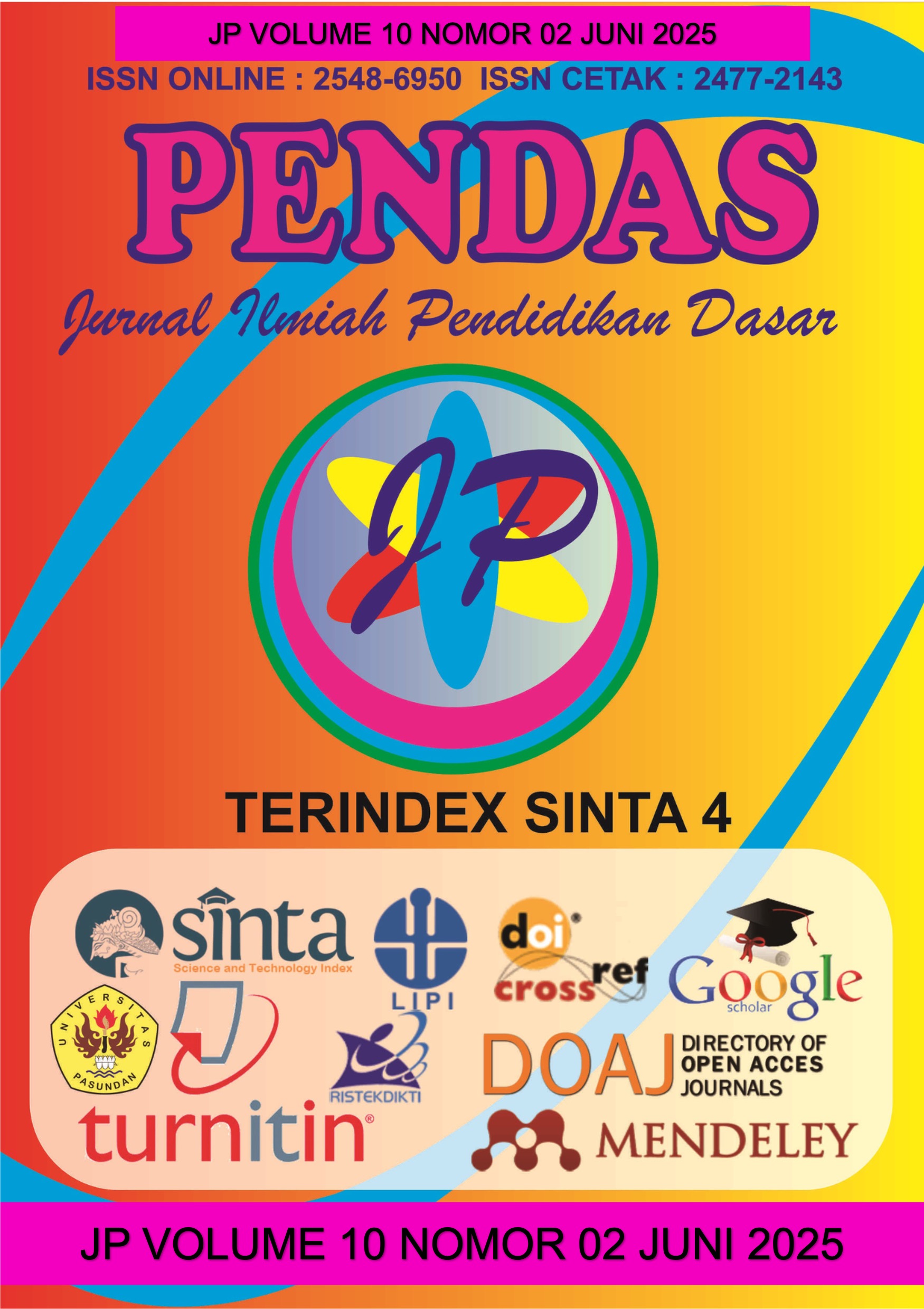PENERAPAN METODE PEMBELARAN ROLE REVERSAL QUESTION DALAM MENINGKATKAN KEAKTIFAN DAN HASIL BELAJAR PKn ANTI KORUPSI KELAS V SDS KARTINI PANIPAHAN
DOI:
https://doi.org/10.23969/jp.v10i02.25404Keywords:
Role Reversal Question, Learning Outcomes, ActivityAbstract
The objective of this research was to describe and identify the improvement in learning outcomes from the application of the role reversal question method in Anti-Corruption Civic Education for grade V students at SDS Kartini Panipahan. The design of this research was Classroom Action Research (CAR), with the object of the research being the application of the role reversal question learning method to enhance student activity and learning outcomes in Anti-Corruption Civic Education. The results and discussions of this research concluded that the PKn learning using the active learning method of role reversal question could improve the learning outcomes of grade V students at SDS Kartini Panipahan. The steps in the active learning model of role reversal question included: the teacher creating questions related to the material before the learning activity began, explaining the learning activities, dividing students into several groups, assigning students to conduct group discussions, assigning students to create individual questions, conducting Q&A sessions by swapping roles, and providing feedback on students' answers. This was indicated by the students who scored ≥70 in cycle I increasing by 25% from an initial condition of 39% to 69%. Subsequently, the students who scored ≥70 in cycle II experienced an increase of 28%, reaching 93%. The average score in cycle I increased by 8.75% from the initial condition of 57.73 to 78.52, and in cycle II, the average score increased again by 10.97%, reaching 86.25.
Downloads
References
Kariadi, D., & Suprapto, W. (2018). Model Pembelajaran Active Learning Dengan Strategi Pengajuan Pertanyaan untuk Meningkatkan Kualitas Proses Pembelajaran PKn. Educatio, 13(1), 11. https://doi.org/10.29408/edc.v12i1.838
Rahman, A., Munandar, S. A., Fitriani, A., Karlina, Y., & Yumriani. (2022). Pengertian Pendidikan, Ilmu Pendidikan dan Unsur-Unsur Pendidikan. Al Urwatul Wutsqa: Kajian Pendidikan Islam, 2(1), 1–8.
Annisa, F., & Marlina, M. (2019). Penerapan Model Pembelajaran Kooperatif Tipe Index Card Match Terhadap Aktivitas Dan Hasil Belajar Matematika Peserta Didik. Jurnal Basicedu, 3(4), 1047–1054. https://doi.org/10.31004/basicedu.v3i4.209
Autoridad Nacional del Servicio Civil. (2021). Metodologi dan pendekatan pembelajaran. Angewandte Chemie International Edition, 6(11), 951–952., 2013–2015.
Diputra, G., & Rokhana, S. (2019). Upaya Meningkatkan Hasil Belajar PKn Menggunakan Model Active Learning Tipe Role Reversal Question pada Siswa Kelas V SDN 1 Tamanrejo Kabupaten Blora. ELSE (Elementary School Education Journal) : Jurnal Pendidikan Dan Pembelajaran Sekolah Dasar, 3(1), 28. https://doi.org/10.30651/else.v3i1.2413
Ernawati, S., Rinanto, Y., & Marjono, M. (2018). Penerapan Model Pembelajaran Inkuiri Terbimbing untuk Meningkatkan Kemampuan Berpikir Kritis Peserta Didik. Bio-Pedagogi, 7(1), 39. https://doi.org/10.20961/bio-pedagogi.v7i1.35727
Farida Payon, F., Andrian, D., & Mardikarini, S. (2021). Faktor yang Mempengaruhi Keaktifan Belajar Peserta Didik Kelas III SD. Jurnal Ilmiah KONTEKSTUAL, 2(02), 53–60. https://doi.org/10.46772/kontekstual.v2i02.397
Heryana, A. (2014). Hipotesis Penelitian. Eureka Pendidikan, June, 1. https://doi.org/10.13140/RG.2.2.11440.17927
Kariadi, D., & Suprapto, W. (2018). Model Pembelajaran Active Learning Dengan Strategi Pengajuan Pertanyaan untuk Meningkatkan Kualitas Proses Pembelajaran PKn. Educatio, 13(1), 11. https://doi.org/10.29408/edc.v12i1.838
Made, S. (2021). P-issn: 2088-7981 e-issn: 2685-1148. 4(2), 304–311.
Octaviani, S. (2017). Pengembangan Bahan Ajar Tematik Dalam Implementasi Kurikulum 2013 Kelas 1 Sekolah Dasar. EduHumaniora | Jurnal Pendidikan Dasar Kampus Cibiru, 9(2), 93. https://doi.org/10.17509/eh.v9i2.7039
Prasetyo, A. D., & Abduh, M. (2021). Peningkatan Keaktifan Belajar Siswa Melalui Model Discovery Learning Di Sekolah Dasar. Jurnal Basicedu, 5(4), 1717–1724. https://jbasic.org/index.php/basicedu/article/view/991
Sari, M. P. (2018). Pengaruh Model Role Reversal Questions (Bertukar Peran Membuat Pertanyaan) Terhadap Hasil Belajar Siswa Kelas V Pada Mata Pelajaran PKn di SDN Gugus V Kecamatan Cakranegara Tahun Pelajaran 2017/2018. hlm.3. http://eprints.unram.ac.id/6133/1/Jurnal Skripsi Mei Patmala Sari.pdf
Susanto, A., & Radiallahuanha, D. (2021). Pengaruh Media Poster terhadap Kreativitas dan Inovasi Anak dalam Pembelajaran Tematik. Jurnal Riset Pendidikan Dasar (JRPD), 2(2), 101. https://doi.org/10.30595/jrpd.v2i2.10187
Pratiwi, nuning. (2017). Penggunaan Media Video Call dalam Teknologi Komunikasi. Jurnal Ilmiah DInamika Sosial, 1, 213–214.
Wulandari, R. A., & Nurani, A. S. (2015). Pengembangan Media Video Tutorial Dalam Mata Kuliah Makanan Oriental. Media Pendidikan, Gizi, Dan Kuliner, 4(2), 2014–2016.
Downloads
Published
Issue
Section
License
Copyright (c) 2025 Pendas : Jurnal Ilmiah Pendidikan Dasar

This work is licensed under a Creative Commons Attribution 4.0 International License.














































